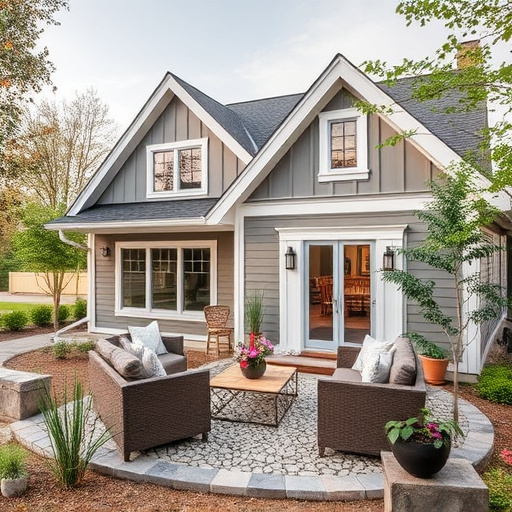Home renovations often face cost overruns due to scope creep, unforeseen issues, and inadequate planning. To avoid budget blowouts, homeowners should focus on meticulous budgeting, breaking down projects into manageable components, regularly reviewing expenses, and creating contingency funds. Through diligent monitoring, record-keeping, and proactive analysis, they can stay within budget, prevent delays, and ensure successful transformations while effectively managing financial aspects of home renovations.
“Looking to embark on a home renovation project without budget surprises? Understanding common causes of cost overruns is key. This article guides you through comprehensive budgeting, effective fund allocation strategies, and monitoring tips for successful home renovations. From identifying potential pitfalls to mastering budget adjustments, these insights ensure your renovation stays on track financially. Maximize your investment and turn your dream space into a reality without breaking the bank.”
- Understanding Common Causes of Cost Overruns in Home Renovations
- The Importance of Comprehensive Budgeting for Successful Projects
- Strategies to Allocate Funds Effectively and Avoid Surprises
- Tips for Monitoring and Adjusting Budgets During the Renovation Process
Understanding Common Causes of Cost Overruns in Home Renovations
Cost overruns are a common challenge in home renovations, often leading to financial strain and project delays. By understanding the primary drivers behind these budget blowouts, homeowners can better prepare and implement effective allocation strategies. One of the main causes is scope creep, where initial plans expand unreasonably, increasing both time and cost. This can occur due to changes in design preferences or unforeseen issues discovered during demolition. Another significant factor is inadequate planning and budgeting. Many renovation projects start without detailed cost estimates, leading to overspending as work progresses. Unforeseen expenses from material price fluctuations or labor shortages also contribute to overruns. Accurate estimating and a well-defined budget are crucial to mitigate these risks.
The Importance of Comprehensive Budgeting for Successful Projects
Comprehensive budgeting is a cornerstone for successful home renovations, offering a roadmap that guides projects from inception to completion. It involves meticulous planning and allocation of financial resources, ensuring every aspect of the renovation—from materials and labor to unforeseen expenses—is accounted for. This proactive approach prevents cost overruns, which can significantly disrupt project timelines and cause undue stress.
A well-crafted budget provides transparency, enabling homeowners and contractors alike to track spending, identify potential savings opportunities, and make informed decisions. It fosters open communication, reduces disputes, and increases the likelihood of staying on schedule. In the dynamic landscape of home renovations, where unforeseen challenges are inevitable, a robust budget serves as a shield against financial surprises, ultimately enhancing project outcomes and ensuring a smooth transformation.
Strategies to Allocate Funds Effectively and Avoid Surprises
When planning home renovations, effective budget allocation strategies are paramount to prevent cost overruns. Start by breaking down the project into smaller components and assigning realistic financial allotments to each. This granular approach ensures that every element of the renovation is considered, from materials and labor to unexpected repairs. Regularly review and adjust your budget throughout the process, comparing actual expenses against your planned allocations.
Additionally, create a contingency fund to account for unforeseen challenges commonly encountered in home renovations. Unexpected issues like structural problems or changing market conditions can significantly impact your finances. Allocating a buffer in your budget allows you flexibility and peace of mind, ensuring that surprises don’t turn into costly setbacks.
Tips for Monitoring and Adjusting Budgets During the Renovation Process

During home renovations, staying on top of budget allocation is key to avoiding unexpected costs and overruns. Regular monitoring involves tracking expenses against the original budget at set intervals, ideally monthly. This process requires keeping detailed records of all expenditures, including receipts and invoices, for transparent accounting. Any deviations from the plan should be promptly analyzed to identify causes, whether it’s unforeseen material costs or changes in scope.
Adjustments are inevitable in home renovations, so being flexible is crucial. If certain aspects of the project require more funds than allocated, re-evaluate priorities and consider redistributing budget accordingly. Regular communication with contractors and architects ensures everyone is aligned on cost implications of design changes. Staying proactive and adaptive ensures the renovation stays on track financially while still achieving the desired outcome.
In the world of home renovations, successful projects aren’t just about transforming spaces; they’re about managing finances effectively. By understanding common cost overruns and adopting strategic budget allocation methods, homeowners can navigate renovation journeys with confidence. Comprehensive budgeting, coupled with careful fund distribution and continuous monitoring, ensures that projects stay on track financially. These practices empower folks to avoid surprises and make informed decisions, turning their dream renovations into reality without breaking the bank.



